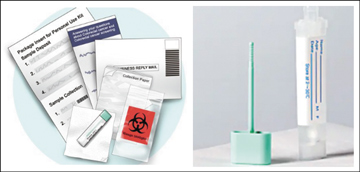![]()
A Focus Outside of COVID
March is Colorectal Cancer Awareness month
Errol Buntuyan, M.D., FAAFP
With the end of the Omicron surge, the rates of positive COVID cases on Maui have decreased to the single digit percentile. The news headlines are no longer filled with the latest COVID variants threatening a new surge or images of overwhelmed hospitals and ICUs. It seems we are in a long overdue break from this pandemic roller coaster ride.
On Maui, proof of vaccination status to dine-in at restaurants or to visit other “high risk” businesses like bars and gyms was lifted at the end of February. The indoor mask mandates and the Hawai‘i State Safe Travels program are still in effect but is due to expire at the end of March. We shall see if Governor Ige extends the mandate through April. As of March 1, 2022 Maui County’s Public Health Emergency Rules are being repealed with Maui County campgrounds and small community centers (Pā‘ia and Ha‘ikū) open for reservations. More COVID restriction updates should be updated and released through the Maui County website in the coming weeks.
During this lull we are now able to focus on other health issues pertinent to our Filipino community. The month of March is Colorectal Cancer Awareness month. Colorectal cancer ranks as the fourth most common type of cancer in the United States. If caught early it is also one of the easiest to treat. The percentage of Americans, however, who actually take early screening tests is low.
This is especially true for Filipino-Americans who are screened in lower numbers than non-Hispanic whites, according to a 2017 report from the American Cancer Society. Unfortunately, this results in higher instances of colorectal cancer, specifically in Filipino men over age 50. I recently learned a high school Filipino classmate lost his battle with colon cancer at age 52.
The fear of being diagnosed with cancer may be the biggest obstacle to effective colorectal cancer screening. Patient education programs may help decrease this fear. The ease of getting screened with a home stool test kit needs to be highlighted. Primary care health offices should send yearly reminders starting at age 45 to do a home stool test kit. This is a simple kit which requires a plastic tip to touch a piece of stool after a bowel movement. You can just send it back in the mail to your provider in a self-addressed stamped envelope.
A colonoscopy is an in office sedated procedure by a specialist using a camera (scope) to visualize the inside of your colon. This is recommended for folks who have a first degree relative who was diagnosed with colon cancer under the age of 60. If you do not have a family history of colon cancer, no longer is there an immediate need or worry to get a screening colonoscopy procedure at age 45. The easy home stool test will be just as effective in screening and if it is positive, then a colonoscopy should be scheduled.

Being aware of the risk factors for developing colorectal cancer is critical and should promote regular yearly stool test screening.
Common risk factors include:
• Age (specifically over 50, thus screening should start at 45)
• Genetics and family history
• Other diseases, like diabetes
• High intake of processed foods and red meats
• Tobacco use
• Excessive alcohol use
Many in the Filipino population may not want to have the recommended screening out of worry and fear of what could be found. We should, however, be focused at finding disease at a precancerous or early stage. This can be done with at home fecal occult blood tests and screening colonoscopies as noted above. This early discovery results in better survival outcomes, a lower risk of cancer recurrence and death from cancer.
The majority of patients diagnosed with colorectal cancer are aged 50 or older. Early detection can result in the removal of precancerous polyps, which prevents the progression of these lesions to cancer. Home stool tests are recommended yearly starting at age 45 and colonoscopies are either every 3 years, 5 years, or 10 years depending on initial scope findings.
In addition to regular colon cancer screening, all people should exercise often and follow a healthy diet which includes a variety of dietary fiber from fresh fruits and vegetables. It is already well known lifestyle changes can make a significant impact on cancer prevention.
Surviving the Omicron surge and living through the worst of COVID the last two years has certainly left an impact on our Filipino community. We hope we can remain in this knowledgeable, controllable and managed period of the pandemic for at least a few months. During this time we can redirect our focus on our general health and wellness.
Now is the time to update your health status, get your overdue lab work done, get your medications refilled and adjusted and set SELF CARE goals to improve upon your general physical and mental wellbeing.
 Errol Buntuyan, M.D. is a Family Medicine Practitioner and the Physician in Charge of Maui Primary Care at Kaiser Permanente. Born in Quezon City and raised in Southern California, he has been practicing medicine on Maui since 2007. Dr. Buntuyan promotes whole food, plant based nutrition, regular physical activity, stress mindfulness and sleep hygiene as keys to optimum health and wellness. He enjoys cooking, playing tennis and travel.
Errol Buntuyan, M.D. is a Family Medicine Practitioner and the Physician in Charge of Maui Primary Care at Kaiser Permanente. Born in Quezon City and raised in Southern California, he has been practicing medicine on Maui since 2007. Dr. Buntuyan promotes whole food, plant based nutrition, regular physical activity, stress mindfulness and sleep hygiene as keys to optimum health and wellness. He enjoys cooking, playing tennis and travel.
